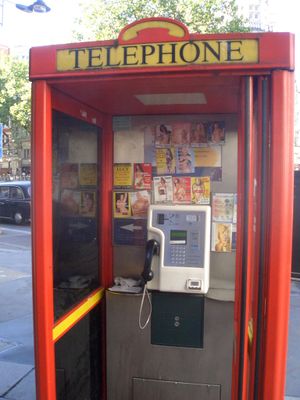Tart cards
Tart cards are cards advertising the services of prostitutes. They are found in many countries, usually in capital cities or red-light districts. The cards originated in the 1960s in places such as Soho, London, as handwritten postcards outside prostitutes' flats or in the windows of newsagents or shops. As direct references to prostitution would generally be unacceptable, the cards were carefully worded and often contained euphemistic references to sex, with terms such as large chest for sale. By the late 1980s, they had become black-and-white photocopied cards containing printed text and telephone numbers. In larger cities, cards began to be placed in phone boxes. In later years they appeared in color and included photographs and mobile telephone numbers or websites. Over time they have become regarded as items of 'accidental art' and developed a cult following. They have influenced the work of mainstream artists, inspiring collections, research, exhibitions and books.
Tart cards by country
- United Kingdom: in London they are placed in phone booths by professional "carders", who tour the phone booths, replacing cards which have been removed by the telephone companies' cleaners. Carders often remove cards placed by rival carders. In the UK, placing them in phone booths has been illegal since the passing of the Criminal Justice and Police Act 2001, although the practice still continues. In Northwest England, the cards are known as slag tags.
They are most common in London but can be found elsewhere in the United Kingdom. They are typically placed in phone booths by professional "carders", who tour the phone booths, replacing cards that have been removed by the telephone companies' cleaners. Placing them in phone booths is now illegal, although it still continues.
- United States: In Hispanic parts of New York City they are known as "Chica Chica" (Girls Girls) cards and men hand them out as flyers at night on the streets. In Las Vegas, they are known as "sex cards" and left on sidewalks and hotel stairways. Cards are placed in phone booths to advertise the services of call girls. They may be found in phone booths and scattered on the streets of Las Vegas, Nevada, and passed out on street corners near the Las Vegas Convention Center.
Similar cards may be found in phone booths and scattered on the streets of Las Vegas, Nevada, where they are known as "sex cards" and passed out on street corners near the Las Vegas Convention Center.
- Argentina: They are found in Buenos Aires.
- Brazil: They are found in São Paulo.
- South Korea: They may be found on the streets and in the public men's toilets of Seoul.
- Poland: Carders place them behind windscreen wipers in the central parts of Warsaw.
- Israel: Business card format advertisements are commonly dropped on street corners in Tel Aviv.
- China: Business cards are given out by pimps to potential customers.
- Macau: They are dropped in the city's sidewalks and underpasses.
- Dubai: Cards advertising "massage" services, often printed with images of scantily-clad young East Asian women, are slipped under front doors or on car windows.
Further reading
- Tart Cards: London’s Illicit Advertising Art, Caroline Archer and Rob Clayton, Mark Batty Publisher, 2003. (ISBN 978-0972424042)
- Tart Cards, Caroline Archer, Baseline 40, edited by Mike Daines & Hans Dieter Reichert, Bradbourne Publishing, 2003.
- The X-Directory, edited by Tony Devlin. Pi34 Publisher, 1993. (ISBN 1898760004)
External links
- Pictures of the inside of a phone booth covered in tart cards
- Pages from The X-Directory
- Tart Art: the prostitute calling cards of London
- More information is available at [ Wikipedia:Tart_cards ]
